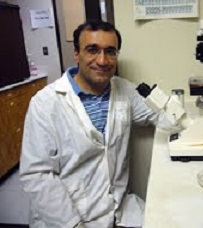Rezvani, Khosrow - BRIN V2
- Associate Professor, Basic Biomedical Sciences
- USD Sanford School of Medicine
- khosrow.rezvani@usd.edu
- Postdoctoral Research Fellow, Baylor College of Medicine, Department of Neuroscience, Houston, Texas
- Ph.D., Molecular Biology, University of Nottingham, U.K.
- M.D., University of Kashan, Iran
Owing to its position as the third leading cause of death in the United States, there is large demand for improved treatments in the battle against cancer. Our laboratory's primary interest is in the ubiquitin-proteasome system's role in cancer pathogenesis. The ubiquitin-proteasome system (UPS) utilizes a small protein, ubiquitin, to target select proteins for degradation. To maintain its high selectivity and efficiency, the UPS cross-talks with several chaperone and accessory proteins, including ubiquitin-like proteins. The family of ubiquitin-like proteins is large, subserving several fundamental regulatory roles in cells, and defects in ubiquitin-like proteins have been found to alter the progression of many cancers. In the laboratory, we focus particularly on the role of these ubiquitin-like proteins in colon and breast cancers.
In collaboration with the Sanford Cancer Biology Research Center and several other laboratories nationwide, we investigate the role of a novel ubiquitin-like protein, UBXN2A (Rezvani et al., 2009) , in colon and breast cancers. We use a multi-pronged approach, including techniques from biochemistry, molecular biology, genomics, and proteomics. Our studies suggest that elevated UBXN2A in early colon and breast cancer progression is an indicator of cellular compensatory responses that enhance pro-apoptotic activities, most likely via a tumor suppressor gene called p53. In addition, tissue microarray data (Alves et al., 2008) and our own results indicate that UBXN2A is enhanced in well-differentiated human colon tumors. Furthermore, our data demonstrate that a similar upregulation is followed by a nucleocytoplasmic translocation of UBXN2A upon genotoxic stress, which can ultimately lead to a p53-induced apoptotic response. Our ongoing studies will provide insights into the role of UBXN2A as a possible anti-cancer chaperone and it raises new directions for more efficient cancer therapy. If UBXN2A can be used as a molecular target for reestablishing proper p53 function in colon or breast cancer patients, its manipulation alongside current chemo- and radiation therapies may lead to improved cancer treatment efficacies.




